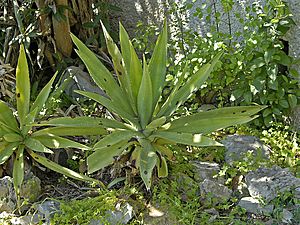Agave decipiens facts for kids
Quick facts for kids Agave decipiens |
|
|---|---|
 |
|
| Agave decipiens at the Orto Botanico dell'Università di Genova | |
| Conservation status | |
| Scientific classification |
|
| Kingdom: | Plantae |
| Clade: | Tracheophytes |
| Clade: | Angiosperms |
| Clade: | Monocots |
| Order: | Asparagales |
| Family: | Asparagaceae |
| Subfamily: | Agavoideae |
| Genus: | Agave |
| Species: |
A. decipiens
|
| Binomial name | |
| Agave decipiens |
|
| Script error: The function "autoWithCaption" does not exist. | |
| Synonyms | |
|
Agave laxifolia J.G.Baker |
|
Script error: No such module "Check for conflicting parameters".
Agave decipiens, also known as False Sisal or Florida agave, is a special plant found only in Florida. It grows naturally along the coast. People also grow it in other parts of the world as a beautiful garden plant. You might find it growing wild in places like Spain, India, Pakistan, and South Africa.
Some scientists once thought this plant might also grow in Central America or Mexico. However, later studies showed that those plants were actually a different kind of agave.
Meet the False Sisal Plant
Where Does It Live?
The False Sisal plant loves to grow in wet, low-lying areas. You can find it on small dry spots called hummocks in the Everglades. It also grows in other marshy places very close to the ocean.
What Does It Look Like?
This plant is quite tall and looks like a small tree. It has a main stem, called a trunk, that can grow up to 4 meters (about 13 feet) high. It often produces new small plants, called suckers, from its base.
Its leaves are usually about 100 centimeters (about 3 feet) long. Some leaves have even been found to be twice that length! The edges of the leaves are wavy and have small teeth.
When it's time to flower, a tall stalk grows up to 5 meters (about 16 feet) high. This stalk has many greenish-yellow flowers grouped together in a large cluster called a panicle. After the flowers, the plant produces a dry seed pod, or capsule, which can be up to 5 centimeters (about 2 inches) long.
 | Anna J. Cooper |
 | Mary McLeod Bethune |
 | Lillie Mae Bradford |


